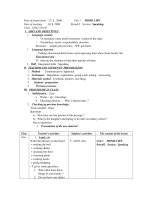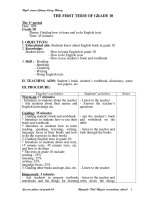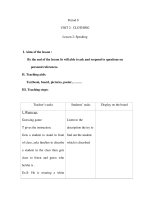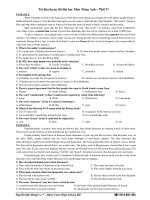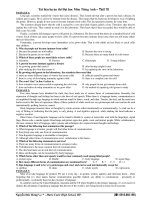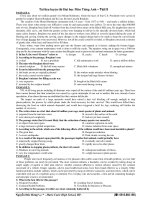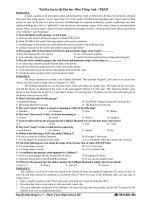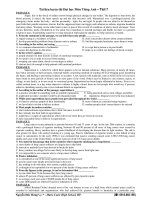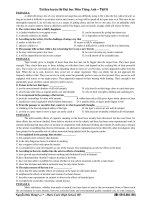gi¸o viªn cao v¨n tiõn gi¸o ¸n líp 12 c¬ b¶n m«n tiõng anh lesson plan unit 1 home life date of planning date of teaching lesson 2 reading i oblectives 1 educational aims guessing meaning from conte
Bạn đang xem bản rút gọn của tài liệu. Xem và tải ngay bản đầy đủ của tài liệu tại đây (151.84 KB, 10 trang )
<span class='text_page_counter'>(1)</span><div class='page_container' data-page=1>
<b>Lesson plan</b>
Unit 1
Home life
Date of planning:………..
Date of teaching:………
………
………
Lesson:2
<i>Reading</i>
<b>I. Oblectives:</b>
<b>1. Educational aims</b>
:- Guessing meaning from context- Passage comprehension.
- Reading and answer questions about the reading.
<b>2. Knowledge</b>
: Học sinh có thể đọc hiểu bài đọc về cuộc sống gia đình, Học sinhhiểu đợc các từ mới qua các hoạt động nói hỏi và trả lời.
<b>3.Skill</b>
:<b> Main skill: Reading</b>
<b> Subskill: Speaking, Listening, Writing </b>
<b>II. Teaching aids: Textbook, Whiteboard markes, Planning lesson,</b>
<b>III. Teaching method: regrate, Communicative</b>
<b>IV. Procedures:</b>
<b>Teacher and Pupils activitives</b>
’
<b>Content</b>
<b>1. Warm up</b>
:T: Write this sentence on the board
P: work in groups
T: Call some Ps to answer question
P: Give their ideas
T: Today, we are going to learn unit 1
FAMILY LIFE
<b>2. Pre-reading</b>
:T: Give some new words
- Project : (n) dự án
- join hands: (v) cùng làm, chung sức
- caringadj) quan t©m tíi mäi ngêi
- rush: (v) véi v·
- eel soup : lÈu l¬n
- attempt (n) dự định, lỗ lc
- take out the garbage: đổ rác
- mischievous: (adj) tinh nghịch
- obedient: (adj) vâng lời, dễ dạy.
- mend : (v) sửa chữa
- close-knit:(adj) quan hệ khăng khít
- supportive: giúp đỡ lẫn nhau
- frankly: (adv) thẳng thắn
P: listen and repeat then take note
T: read the passage silently and do the
excercises.
P: read the passage
<b>3. While-reading</b>
:T:read the text and do the task 1
P: guess the meaning of the words
T: read the text again then answer the
questions
<b>Complete the sentence by filling the gaps </b>
<b>with the suitable words.</b>
<b>---build the house…………make it </b>
<b>home.</b>
<i><b>Answer;</b></i>
<i><b>Men</b><b> build the housewomen make it home</b></i>
<b>Work in pairs. Ask and answer these </b>
questions…
<i>- Who do you think they are? (parents and </i>
<i>children)</i>
<i>- Where is the family?(at home)</i>
<i>- What is each member of the family doing? (</i>
<i>The mother is helping the daughter with her </i>
<i>study, the father is playing with the son.)</i>
<i>-How do you feel when you see such a warm </i>
<i>and peacefull scene?/ the scene of a happy </i>
<i>family where people love and support each </i>
<i>other?</i>
Task 1. Choose the sentence A,B,Cor D that
is nearest…
1 2 3 4 5
B C A B A
Task 2. Answer the questions:
</div>
<span class='text_page_counter'>(2)</span><div class='page_container' data-page=2>
P: work in pairs and answer questions
P1: How busy are the parents in the passage?
P2:………..
P1: and so on
<b>4. Post-reading</b>
:T: work in groups
- Compare your family with the family
in the the passage ( let them speak
freely )
- Discuss the importance of the family
and each member should do to build
it.
P: work in groups
<i>2. She is always the first one to get up in </i>
<i>the morning to make sure that her children </i>
<i>leave home for school having eaten </i>
<i>breakfast and dressed in suitable clothes. </i>
<i>She always makes dinner ready before her </i>
<i>husband comes home.</i>
<i>3. The daughter helps with household </i>
<i>chores: she washes the dishes and takes out </i>
<i>the garbage. She also looks after the boys/ </i>
<i>her younger brothers. The father sometimes </i>
<i>cooks/ does some cooking or mends things </i>
<i>around the house at weekends.</i>
<i>4. She attempts to win a place at university.</i>
<i>5. Because they are very close-knit and </i>
<i>supportive of one another. They often share </i>
<i>their feelings and whenever problems come </i>
<i>up, they discuss them frankly and find </i>
<i>solutions quickly.</i>
Work in groups. Compare the family
described in the text wiyh your own family.
<i>Take care of one another, share household </i>
<i>chores,obey family s rules, etc</i>’ …
<b>5. Home work</b>
: - Summarize the main points.- Assign homework.
- Prepare new lesson.
<b>6. Comment</b>
: ………. ……….
……….
<b>Lesson plan</b>
Unit 1
Home life
Date of planning:………..
Date of teaching:………
………
………
Lesson:3
<i>Speaking</i>
<b>I. Oblectives:</b>
<b>1. Educational aims</b>
: - Asking and answering about household chores and family life.- Know to practice dialouge
<b>2. Knowledge</b>
: Hỏi đáp và thảo luận về cuộc sồng gia đình, mối quan hệ và nhiệm vụcủa các thành viên trong gia đình
<b>3.Skill</b>
:<b> Main skill: Speaking</b>
<b> Subskill: Reading, Listening, Writing </b>
</div>
<span class='text_page_counter'>(3)</span><div class='page_container' data-page=3>
<b>III. Teaching method: regrate, Communicative</b>
<b>IV. Procedures:</b>
<b>Teacher and Pupils activitives</b>
’
<b>Content</b>
<b>1. Warm up</b>
:T: In just one minute write down on a piece
of paper a list of things considered as
household chores.
P: work in groups of four
T: go around and check
P: give examples
T: Asking and answering about household
chores and family life.
<b>2. Pre-speaking</b>
:T: ask them to read the sentences and do
exercises.
P: work individually
T: go round the class and help if nesseccery
Call some ps to answer
T: can ask some questions
- What do your parents do?
- How does your father share the house hold
chores?
- Don’t you like watching football matches
on TV?
- Do you ask your parents before making an
important decision? Why?
<b>3. While-speaking</b>
:T: Work in pair to find out wether your
partner’s family life is like yours.
P: Work in pairs
T: go round the class to check and help
T: write these sentences on the board and ask
Ps to read one or two times.
P: listen and repeat.
T: focus some general mistakes or difficult
problems to correct
T: work with a different parner and ask him or
her about……
Suggested answers:
- to clean the floor
- to cook
- to do the washing up
- to wash clothes
- to tidy the kitchen
- to iron clothes
- to take out the garbage
E.x: My main responsibility is to wash
dishes
My mother often cooks for the whole
family.
Task 1: Read the following senteces and tick(
) the one that
Suggested answer:
<i>In my family both my father and mother go </i>
<i>to work. Almost all members of my family </i>
<i>share the house hold chores. Washing the </i>
<i>dishes and cleaning the house are what I </i>
<i>often do to help my parents. We all like </i>
<i>waching films on TV when we have free time</i>
<i>at weekends. The person I often share my </i>
<i>secrets with is my sister. I always ask my </i>
<i>parents for advice before making an </i>
<i>important decision.</i>
Task 2: Prepare a list of questions to ask
another student to find out…
Special expressions:
<i>- Could you tell me who?</i>
<i>- By the way who in your family does the </i>
<i>washing up?</i>
<i>- What about your brother?</i>
Gỵi ý:
<i>- Could you tell me who works in your </i>
<i>family?</i>
<i>- What about your brother? Does he share </i>
<i>the house hold chores?</i>
<i>- What s your responsibility in your family?</i>‘
<i>- What exactly do you have to do?</i>
<i>- How do you share the house hold chores?</i>
<i>- What interests do your family members </i>
<i>share together?</i>
<i>- What do your family members often do </i>
<i>together in your free time?</i>
<i>- Who do you often share your secrets with?</i>
<i>- Who do you often talk to before making an </i>
<i>important decision?</i>
Task 3: Use the questions you have formed to
ask your partners about…
</div>
<span class='text_page_counter'>(4)</span><div class='page_container' data-page=4>
<i><b>Nam: Hi Tam. Could you tell me abit about </b></i>
<i>your family life?</i>
<i><b>Nam: Who works in your family?</b></i>
<i><b>Nam: So they must very busy. Do you help </b></i>
<i>them with the house hold chores?</i>
<i><b>Nam: What about your father?</b></i>
<i><b>Nam: What interests do your family </b></i>
<i>members share closely? </i>
<i><b>Nam: And who do you often share your </b></i>
<i>secrets with?</i>
<i><b>Nam: So is she the person you often talk to </b></i>
<i>before making an important decision?</i>
<i><b>Nam: You must be very happy in such a </b></i>
<i>family. Thanks for giving me time . Bye.</i>
P: practice in pairs
T: go round class and help then correct
mistakes
<b>4. Post-speaking</b>
:T: Get back to your orginal pairs. Tell your
partner information you have collected.
P: practice in pairs.
<i><b>Tam: Both my parents. They work from 7.30</b></i>
<i>to 16.30 everyday.</i>
<i><b>Tam: Of course. I help my mother in the </b></i>
<i>kitchen and wash the dishes after meals.</i>
<i><b>Tam: He cleans the floor and sometimes </b></i>
<i>when my mom is out on business he cooks </i>
<i>for us.</i>
<i><b>Tam: Watching films. We often watch films </b></i>
<i>on TV on Saturday evenings when everybody</i>
<i>is free.</i>
<i><b>Tam: My mother. I think she understands me</b></i>
<i>well.</i>
<i><b>Tam: No, in fact both my parents help me a </b></i>
<i>lot when I have problems.</i>
<i><b>Tam: Bye.</b></i>
Task 4: Tell each other information you have
collected.
<i>I have just talked with Tam about her family </i>
<i>life. She told me that both her parents go to </i>
<i>work so they are very busy. So she has to </i>
<i>share the household chores. She often helps </i>
<i>her mother in the kitchen and washes the </i>
<i>dishes after meals.Her father is also willing </i>
<i>to help with the housework. He cleans the </i>
<i>house and sometimes whem Tom mom is out </i>’
<i>on business, he cooks. All the members of </i>
<i>her family enjoy watching films together on </i>
<i>Saturday evenings. She shares her secrets </i>
<i>with her mother because she thinks that her </i>
<i>mother understands her well; however, both </i>
<i>parents help her make important decisions.</i>
<b>5. Home work</b>
: - Summarize the main points. - Assign homework.
- Prepare new lesson.
<b>6. Comment</b>
: ………. ……….
……….
<b>Lesson plan</b>
Unit 1
Home life
Date of planning:………..
Date of teaching:………
………
………
Lesson:4
<i>Listening</i>
<b>I. Oblectives:</b>
</div>
<span class='text_page_counter'>(5)</span><div class='page_container' data-page=5>
- Listening for specific information
- Listening comprehension about family life.
<b>2. Knowledge</b>
: Học sinh nghe và lấy thông tin từ cuộc nói chuyện giữa Paul và Andresvề cuộc sống gia đình của họ.
<b>3.Skill</b>
:<b> Main skill: Listening</b>
<b> Subskill: Reading, Speaking, Writing</b>
<b>II. Teaching aids: Textbook, Whiteboard markes, Planning lesson, casste player</b>
<b>III. Teaching method: regrate, Communicative</b>
<b>IV. Procedures:</b>
<b>Teacher and Pupils activitives</b>
’
<b>Content</b>
<b>1. Warm up</b>
:(Jumbled word)
P: close their books.
T: ask them to do exercise
<b>2. Pre-listening</b>
:T: give some questions
Give some new words before listening
<i>Big family, a big meal, special occasion, lots </i>
<i>of food, leftovers, spread out, holiday season,</i>
<i>coach, plane, a flight.</i>
T: listen and repeat
<b>3. While- listening</b>
:T: You will hear Paul and Andrea talking
about their family life. Listen to the tape …
P: Listen to the first times
T: check
P: Listen to the second times
T: check again
P: listen to the third times and answer
questions
T: Listen again and note down things that are
different about Paul’s and Andrea’s families.
Read the request one times and then play the
tape
P: Listen the first times
T: call them to give the answers
P: Answer
<b>4. Post- listening</b>
:T: Discuss the importance of family in a
person’s life
Start asking some questions:
- Is family very important to you? Why
do you think so?
- How many people are there in your
Rearrange the letters to make a meaningful
word . RINENOU
Answer: RINENOU— family reunion
- Who do you see in the picture?
- Who are they?
- Do you think they all live in the same
house?
- What are they doing?
- Is that a usual or special meal? How
do you know?
- Have they eaten up all the food on the
table?
- On what occasions do people come
home to have a family reunion?
- How do they come home?
Look at the picture below and describe….
- <i>What s happening in the picture?( A </i>’
<i>family is having a big meal.)</i>
- <i>How many people are there?/Who are</i>
<i>they? (9 people)</i>
- <i>How are they felling?/How do they </i>
<i>look?( very happy )</i>
Task 1. Listen to the conversation between…
1 2 3 4 5
F F F T T
Why do you think it is true/false?
Task 2. Listen again and note down two
things that …
Paul Andrea
<i>His family members </i>
<i>are not very close.</i> Hers is a very close-knit family.
<i>The family often eat </i>
<i>the meals the mother </i>
<i>cooks at home.</i>
<i>The family often go </i>
<i>out to eat when they </i>
<i>get together.</i>
Suggested answer;
</div>
<span class='text_page_counter'>(6)</span><div class='page_container' data-page=6>
family? Who are they?
- Do all members of your family live
together?
- Do they often get together on special
occasion? Do you have big meals
together?
<i>have appoitments or failures in life.</i>
<i>- My family is a big one because I have three</i>
<i>sisters and two brothers. They are all </i>
<i>married and each has two children. Beside </i>
<i>my oldest sister, the mother are spread out </i>
<i>the country. One in Ha Noi, one is in Nha </i>
<i>Trang…..</i>
<b>Tapescript. </b>
<i><b>Listen to Paul and Andrea talking about their family life. What are two things that are </b></i>
<i><b>different about Paul s and Andrea s family?</b></i>’ ’
P- So, Andrea, you’re going home for the holiday?
A- I am sure, I’ve booked a flight for tomorrow afternoon and I can’t wait.
P- that sounds great.
A- What about you? Going home too?
P- I haven’t decided yet. I’m still considering…
A- Haven’t decided yet? Oh, you are never going to get a flight out of here. All the seats
have been reserved by now I’m sure. It’s the holiday season, after all.
P- Well, it’s not very important to me. My family lives about 180 kilometres from here. I
usually take the train or the coach.
A- You don’t sound excited about it.
P- Well, we are not really a very close-knit family. I have three brothers, and they’ve spread
out all over the place. We rarely get together as a family any more.
A- Well, I try to get home as soon as possible. We’re a big family- there are six of us-
children- so it’s always a lot of fun.
P- Six kids?
A- Yes, And we’re all really close. My brothers are married, so it makes for a very crowded
home over the holiday. And there are too many people to cook for, so we end up going out to
dinner a lot. That’s also fun.
P- Well, at my home , my mother loves to cook, so when we get home she often cooks big
meals. We have leftovers for days.
<b>5. Home work</b>
: - In not more than 100 words write about your family reunion.- Assign homework.
- Prepare new lesson.
<b>6. Comment</b>
: ………. ……….
……….
<b>Lesson plan</b>
Unit 1
Home life
Date of planning:………..
Date of teaching:………
………
………
Lesson:5
<i>Writing</i>
<b>I. Oblectives:</b>
<b>1. Educational aims</b>
: After lesson, puples can write a letter for a pen friend aboutfamily rulus
</div>
<span class='text_page_counter'>(7)</span><div class='page_container' data-page=7>
<b>3.Skill</b>
:<b> Main skill: Wrinting</b>
<b> Subskill: Speaking, Listening, Writing </b>
<b>II. Teaching aids: Textbook, Whiteboard markes, Planning lesson,</b>
<b>III. Teaching method: regrate, Communicative</b>
<b>IV. Procedures:</b>
<b>Teacher and Pupils activitives</b>
’
<b>Content</b>
<b>1. Warm up</b>
:T: In one minute make as many sensible
sentences as you can by joining the sentence.
P: work in groups of four
T: call on some ps to tell their answers
P: take note on the board
Which group write a lot will win
T: correct mistakes then guide to new lesson
<b>2. Pre-writing</b>
:T: read the instruduction and present for
students.
P: work in groups tell the rules they have in
their family
<i>Lu ý học sinh cách sử dụng khác nhau giữa </i>
<i>let vµ allow: </i>
<i>- let somebody do something</i>
<i>- allow somebody to do something</i>
<i>- have to: dùng để nói về nghĩa vụ</i>
<i>Ex:- I have to…</i>
<i> - My parents want me to..</i>
<i> - They allow me to….</i>
<b>3. While- writing</b>
:T: ask them to do the tast
P: work individually
T: go around and help if nessesary
<b>4. Post- writing</b>
:Doing the writing task 2 student’s work book.
Suggested answer:
<i>- My parents don t let me come home late.</i>’
<i>- My father permits me to use the family </i>
<i>motorbike.</i>
<i>- I have to do the house hold chores.</i>
<i>- My father doesn t have to do the house </i>’
<i>hold chores.</i>
<i>- I am allowed to talk on the phone with </i>
<i>friends</i>
Task 1: Work in groups. What rules do you
have in your family? Discuss…
<i>a)- My parents don t allowed me to go out </i>’
<i>with friends at night.</i>
<i>- I am not allowed to use my family </i>
<i>motorbike until I have a driving license.</i>
<i>- I have to prepare meals when my mother is</i>
<i>out.</i>
<i>b)- keeping pets</i>
<i>- water the plants and flowers</i>
<i>- emptying the dustbins</i>
<i>- scrubbing the toilet</i>
<i>- ironing/ folding the clothes</i>
<i>- tidying up the kitchen </i>
<i>- feeding the pets</i>
<i>- listening to loud music after 9 p.m</i>
Task 2: Use the ideas you have discussed
above to write a letter to…….
<i>Suggested answers : Every family has its </i>
<i>own rules. Mine has a few. First, I have to </i>
<i>prepare meals because my mother is very </i>
<i>busy with her work. Next, I am permitted to </i>
<i>watch TV after I have finished my </i>
<i>homework. My mother also lets me talk on </i>
<i>the telephone with friends provided that I </i>
<i>don t use it too long. As a girl, I am not </i>’
<i>permitted to come home late except for some</i>
<i>special reasons. My parents don t allow me </i>’
<i>to use the family motorbike for fear that I </i>
<i>may have accident. Despite the rules, we all </i>
<i>feel comfortable and safe because we know </i>
<i>that our parents want the best things for us.</i>
<b>5. Home work</b>
: - Summarize the main points.- Assign homework.
- Prepare new lesson.
</div>
<span class='text_page_counter'>(8)</span><div class='page_container' data-page=8>
……….
……….
<b>Lesson plan</b>
Unit 1
Home life
Date of planning:………..
Date of teaching:………
………
………
Lesson:6
<i>Language Focus</i>
<b>I. Oblectives:</b>
<b>1. Educational aims</b>
:- After lesson, ps can know about the pronunciation of theending“s’ and the revision of Simple past, past progressive and present perfect
<b>2. Knowledge</b>
: Ôn tập một số thời quá khứ đơn, quá khớ tiếp diễn, và quá kh hoàn thành<b>3.Skill</b>
:<b> Main skill: Pronunciation </b>
<b> Subskill: Reading, Speaking, Listening, Writing </b>
<b>II. Teaching aids: Textbook, Whiteboard markes, Planning lesson,</b>
<b>III. Teaching method: regrate, Communicative</b>
<b>IV. Procedures:</b>
<b>Teacher and Pupils activitives</b>
’
<b>Content</b>
<b>1.Warm up</b>
: Correcting mistakes:
T: Giáo viên viết lên bảng vài câu trong đó
mỗi câu có chứa một lỗi sai liên quan tới
phần học sinh sẽ đợc học
P: Thảo luận nhanh theo nhóm để tìm lỗi sai
T: Tập trung ý kiến trớc lớp và giải thích
<b>2. Presentation :</b>
PRONUNCIATION
T:
<i><b>Presentation 1 </b></i>
T:
Give some rules about the ways ofpronunciation the words ending “s’
P: Listen to and repeat
<i>1) When I was a little girl I often help my </i>
<i>parents with house hold chores</i>
<i>2) Unlike most men my father enjoyed </i>
<i>cooking.</i>
<i>3) My brothers never worked long hours like</i>
<i>this before.</i>
<i>Suggested answer:</i>
<i><b>1) When I was a little girl I often helped my </b></i>
<i>parents with house hold chores</i>
<i><b>2) Unlike most men my father enjoys </b></i>
<i>cooking.</i>
<i><b>3) My brothers have never worked long </b></i>
<i>hours like this before.</i>
Qui tắc cơ bản của việc phát ©m c¸c tõ tËn
cïng víi ‘s’
<i>(i) s đ ợc phát âm là/z/ khi đi sau các ©m </i>
<i>h÷u thanh( trõ 3 ©m z, )</i>
<i>Ex: bags/bœgz/, kids/kidz/, days/deiz/</i>
<i><b>H÷u thanh</b>: b,d,g,v, z……, m,n l,r,w,+ toàn </i>
<i>bộ nguyên âm </i>
<i>(ii) s đ ợc phát âm là/s/ khi đi sau các âm vô</i>
<i>thanh (trõ 3 ©m:s, )</i>
<i>Ex: bats/bœts/, kits/kits/, dates/deits/</i>
<i><b>V« thanh</b>: p,t,k,f,h ,s </i>
</div>
<span class='text_page_counter'>(9)</span><div class='page_container' data-page=9>
Grammar
T:
<i><b>Presentation 2 </b></i>
T: Give formation of the present continuos
and ask them to listen and take note
P: listen and take note.
T: Give the usage of the present cotinuos
P: take note.
<b>3. Practice </b>
:Pratice 1
T: ask them listen to the tapes and repeat
P: Listen to the tapes.
Pratice 2
T: ask them to do exercises in the book
P: Work in pairs and exchanges the task.
T: check in front of the class
<b>4. Production </b>
:Production 1
T: Ask them to listen to sentences and then
repeat.
P: listen and repeat.
Production 2
T: Ask them to work in pairs and complete
the exercises.
P: work in pairs and compare with their
friends.
<b>present continous;</b>
<b>A. formation;</b>
+) S +
<i>ARE</i>
<i>IS</i>
<i>AM</i>
+ V- ing
-) S +
<i>ARE</i>
<i>IS</i>
<i>AM</i>
+ NOT +V-ing
?)
<i>ARE</i>
<i>IS</i>
<i>AM</i>
+ S +V-ing …?
<b> Ex; He is reading a book.</b>
<b> He is not reading a book.</b>
<b>B. usage; Diễn tả một hành động đang xảy </b>
ra vào thời điểm đang nói. Thờng đi kèm với
“now”, “at this moment “
<b> Ex; He is reading a book now. </b>
Listen and repeat.
<i>/s/</i> <i>/z/</i>
<i>bats</i>
<i>kits</i>
<i>speaks</i>
<i>dates</i>
<i>photographs</i>
<i>bags</i>
<i>kids</i>
<i>speeds</i>
<i>days</i>
<i>halves</i>
Exercise 1: Underline the most suitable
tense.
<i>1) Have you seen 5) didn t listen</i>’
<i>2) did you enjoy 6) Have you two </i>
<i>met</i>
<i>3) was 7) Did you meet</i>
<i>4) Did you give- saw</i>
Practice reading these sentences.
<i>1) How many times have you played these </i>
<i>games?</i>
<i>2) Do you get any letters from your sistes </i>
<i>and brothers?</i>
<i>3) Those are my wife s handkerchiefs.</i>’
<i>4) Ruth is recording the births and deaths in </i>
<i>this city.</i>
<i>5) Everyday John be gs us to go with him.</i>
Exercise 2: decide which answer…
<i>1.B</i> <i>6.B</i> <i>11.B</i>
<i>2.C</i> <i>7.B</i> <i>12.C</i>
<i>3.A</i> <i>8.C</i> <i>13.C</i>
<i>4.A</i> <i>9.B</i> <i>14.A</i>
<i>5.B</i> <i>10.C</i> <i>15.B</i>
<b>5. Home work</b>
: - Summarize the main points. - Assign homework. Do exercise 1,2,3,4.. I student’s book
- Prepare new lesson.
<b>6. Comment</b>
: ……….</div>
<span class='text_page_counter'>(10)</span><div class='page_container' data-page=10></div>
<!--links-->
